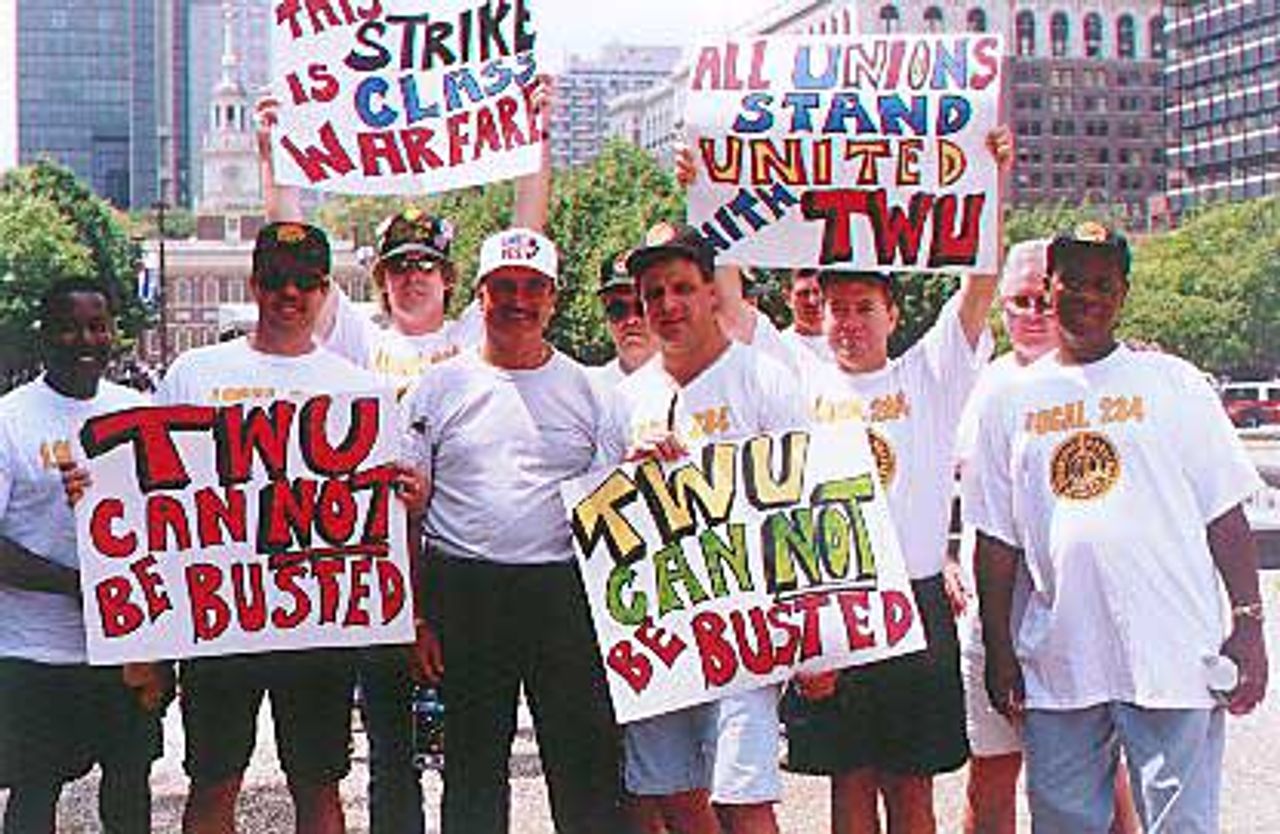Negotiators for Transport Workers Union Local 234 and the Southeastern Pennsylvania Transportation Authority (SEPTA) bargained throughout the weekend and Monday but failed to reach an agreement in the four-week transit strike by 5,500 workers which has shut down all bus, subway, and trolley service in Philadelphia. The strike has affected some 435,000 daily commuters.
Last week union and management participated in five days of intensive negotiations, the first significant talks since the June 1 strike began. TWU President Steve Brookens has stated he would not accept SEPTA's concessions demands. However, all indications are that the union is preparing to climb down from its position. Over the weekend the TWU asked for an analysis of how much their contract proposals--or what they had agreed to thus far--would cost SEPTA if accepted. Union officials said they want to look at SEPTA's numbers, especially the cost of pension-plan changes, to evaluate whether this and other changes meet the union's requirements.
 On Saturday, over 1,000 strikers and union supporters from around the country rallied at Independence Hall. Supporters included TWU members from New York and Michigan, workers from Columbia University, members of the Seafarers International Union, New Jersey public employees, food industry workers, city workers, teachers, firefighters, bridge toll collectors, and welfare rights activists.
On Saturday, over 1,000 strikers and union supporters from around the country rallied at Independence Hall. Supporters included TWU members from New York and Michigan, workers from Columbia University, members of the Seafarers International Union, New Jersey public employees, food industry workers, city workers, teachers, firefighters, bridge toll collectors, and welfare rights activists.
At the rally Brookens vowed that the union would not accept part-time employment, privatization and contracting out. He and other union leaders also said they would shut down rail lines linking the city and the suburbs Monday morning if an agreement was not reached in the 'make or break' negotiating session Sunday. However, by Sunday evening the state mediator issued a statement saying the union leaders had backed down from the threat at his request.
With city bus, trolley and subway-surface lines at a standstill, as well as some suburban bus service, the 260 trains of the regional rail system have been a crucial means for SEPTA to undermine the impact of the strike. Management has added extra cars to accommodate about 135,000 daily passenger trips, compared with an average of 90,000 a day before the strike.
The city's Democratic mayor, Ed Rendell, has openly sided with SEPTA management and expressed support for any actions they take to break the strike. The TWU leadership, while criticizing Rendell, has made it clear that it has no intention of breaking its political ties to Rendell and the Democrats. Last week Brookens wrote to the site committee which is touring Philadelphia to consider the city as a possible location for the Democrats' national convention in 2000. In his letter, the TWU president describes how Rendell is backing SEPTA 'while ignoring our concerns about what management wanted to take from our members.' He said, 'working people are unhappy with the city's 'number one Democrat.'' But, Brookens said, the union is still 'committed to keeping Philadelphia a key element in any Democratic Party election strategy.'
The WSWS spoke with strikers at the rally. Joe Bureness, a SEPTA machinist, said, 'It's a good sign they are talking, but I'm learning we have to stick together. They want to change the way we pick jobs so they can do it by favoritism rather than seniority. We have to pick every six months. This is still on the table. They settled the easy stuff, now they're getting closer to the nitty-gritty. They also want to drop our dental and prescription plans and make us get them through an HMO. The other major issue is part-timers. This would divide the union. Part-timers get no benefits. You can't raise a family as a part-timer.'
Roderick Royster, a bus driver, said, 'This strike did not have to happen. There is no way we will accept part-timers. What we have here is just the beginning. Unions are not going to put up with what's going on. The hiring of part-timers is crap. SEPTA wants them to work 48 months before they get full pay and benefits. They would be doing full-time work for part-time pay. I have 24 years with the company and not a day of sick pay. There are a lot of guys like that. We are not the lazy bums SEPTA calls us. This is my seventh strike. I'll be retiring soon, but I'm here for the younger guys. You don't get anything without a fight.'
Also joining the rally were members of the International Union of Operating Engineers, Local 716. Twelve of their members, who include bridge toll collectors, maintenance and construction workers for four bridges linking Philadelphia and New Jersey, were fired earlier this month for a May 16 demonstration in which 70 demonstrators were arrested during a protest march that shut down the bridge for more than an hour. The protests are the result of the layoff of 18 union toll collectors by the Delaware River Port Authority on May 2 and their replacement with part-time, nonunion toll collectors. The union has been without a contract since January 1997.
After Saturday's rally, the fired workers and over 100 supporters marched across the bridge, with a highly restricting court permit banning disruption of traffic, behind a banner saying, 'Stop Privatization.'
See Also:
Walkout at General Motors enters fourth week
GM's hard line staggers United Auto Workers officials
[30 June 1998]
